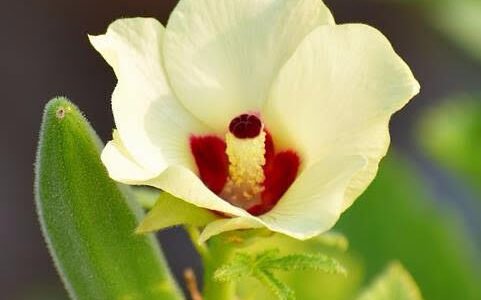Organic Okra – Gift of the Goddesses.
Cleopatra of Egypt and Yang Guifei, who was known as one of The Four Beauties of Ancient China, were two of the worlds most powerful and elegant women that had something else in common, they both loved to eat Okra.
An edible ornamental annually flowering plant belonging to the same family as hibiscus and cotton, it is a pod vegetable and nightshade.
Okra is an erect herb with stems that contain hairs. The whole plant has an aromatic smell resembling that of cloves and with similarities to the cotton plant, though okra has much larger and rougher leaves and a thicker stem.The term “Okra” refers to the edible seedpods of the plant.
Also commonly referred to as ladyfingers, or by its biological names Abelmoschus esculentus and Hibiscus esculentus, Organic Okra is known to have a positive effect on blood sugar control, among many other health benefits
Okra was apparently first discovered in the Abyssinian center of origin of cultivated plants, an area that includes present-day Ethiopia, the mountainous or plateau portion of Eritrea, and the eastern, higher part of the Anglo-Egyptian Sudan.
Since the Spanish Moors and the Egyptians of the 12th and 13th centuries used an Arab word for okra, it probably was taken into Egypt by the Muslims from the East who conquered Egypt in the seventh century.
It’s also believed that the plant was taken from Ethiopia to Arabia across the Red Sea or the narrower strait at its southern end.It was then spread over North Africa, completely around the Mediterranean, and eastward, reaching India after the beginning of the Christian Era.
Okra pods can be: eaten raw, steamed, cooked, or fried, or included in stews and soups.
For soups and stews, the pods are often used since they turn into a gooey mucilage after being cooked.
However, the mucilage can be avoided if the pods are prepared with acidic ingredients like lemon juice or vinegar.
Okra contains potassium, vitamin A, vitamin B, vitamin C, folic acid, and calcium. It’s low in calories and has a high dietary fiber content.
Popular forms of Okra for medicinal purposes include Okra Water, Okra Peels, and Powdered Seeds.
Okra has been suggested to help manage blood sugar in cases of type 1, type 2, and gestational diabetes.
Due to it’s content of vitamin A, vitamin C, iron, and magnesium okra can be very helpful in producing more red blood cells in the human body.
Which means that those suffering anemia can derive substantial health benefits when consuming this wonderful plant.
Okra leaves are most commonly cooked as the heat softens the leaves and helps reduce their spiny texture.
They can be used in lieu of spinach in recipes where greens are called for.
They can be sautéed, stir-fried or used in soups stews and curries.
A good source of vitamins A and C as well as calcium, fiber, protein and iron makes them great for strong bones and good digestion.
Whether you want to improve your heart health, eye sight, digestion, cholesterol levels, bone density or blood sugar or even increase energy levels, lower inflammation, reduce depression or have a radiant complexion Okra pods, leaves and stems might be just what you need.
Ele Naturale
Subscribe to our monthly emails on Health
References:
http://www.diabetes.co.uk/
https://www.healthline.com/
https://www.
http://www.nutritionfox.com/9-
https://drhealthbenefits.com/



